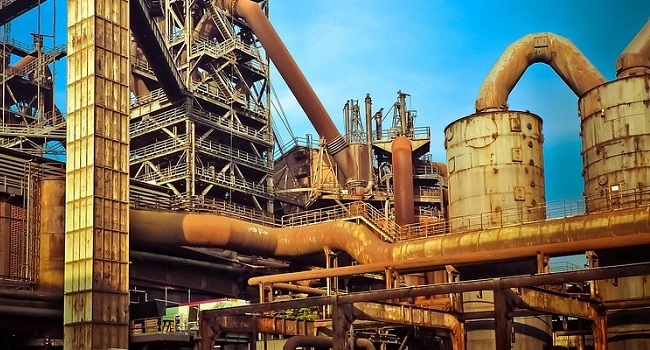Business
AJAOKUTA: After spending $6bn, will $1.5bn lifeline rescue one of Nigeria’s biggest industrial projects?

Indications emerged on Wednesday that the completion of the multibillion dollar, crisis-held Ajaokuta Steel Mill project was round the corner as the Nigerian Government unveiled plans to firm up its own end of the bargain with the trade partner, Russia.
According to the Nigerian Government, Russia and Afreximbank would bankroll the capital required to see the plant to completion.
Olamilekan Adegbite, Mines and Steel Development Minister, gave the declaration Tuesday in Lagos, assuring Nigerians that Nigeria and Russia would ink the deal before the end of January.
A grand, expansive venture by all standards, the project has been a bumpy ride from conception, dating back to 1967 when a number of Russian experts landed in Nigeria to prospect for iron ore somewhere around the mineral-rich Middle Belt.
For investors on both sides, the construction of the multi-billion dollar plant has been a study of faith under pressure for investors for well over five decades, marked by moments of foot-dragging, approval delays, failed privatisation bids, and a couple of backs and forths between the parties.
It reached its watershed moment last October, at the Russia-Africa Summit, when President Muhammadu Buhari and Russia’s Vladimir Putin struck a synergy between them to complete all abandoned projects started off by both nations.
Adegbite informed journalists that there was a huge possibility the plant could be rejuvenated “without spending the revenue that we don’t have.”
He went further to state that “so, we agreed with the Russian government. Hopefully by the end of this month, the MOU will be signed. It was agreed between President Muhammadu Buhari and President Putin that we would complete Ajaokuta on a government-to-government basis.
“The funding will come from Afreximbank and the Russian Export Centre. Jointly, they will fund the resuscitation of Ajaokuta and the payback will come from Ajaokuta itself. Once Ajaokuta starts operation, the experts that will come from Russia will run it; of course, the terms will be agreed.”
Nigeria had committed funds in the neighbourhood of $6 billion to the plant since inception, according to the Mines and Steel Minister, further stating that the sum would have soared dramatically at current rate if adjusted for inflation.
In his words, the 24,000-hectare plant was between 95% and 98% completed, stating that Russia will complete it, operate it for many years to recoup its investment and hand over ownership to Nigeria thereafter.
Read also: In case you missed it, an expert’s view on Nigeria’s revenue and tax systems
He emphasised that “we are looking at two and half years for Nigeria to begin to produce steel and this is a game changer for Nigeria. It will save us a lot in foreign exchange. Working at full operation, Ajaokuta will employ 10,000 engineers.”
Detailing the modalities of the contract, Adegbite mentioned that “Afreximbank is bringing $1bn to the table and the Russian Export Centre is bringing $460m. It is a debt, not equity; and it is coming at the rate of five per cent.”
“But it is not so much a debt to Nigeria because Mr President has told us that he doesn’t want Nigerian money involved in it. The business case built around Ajaokuta is such that it will pay back by itself. So, we are not going to use taxpayers’ money to pay that debt.”
Adegbite reiterated the economic importance of Nigeria producing steel given its fundamental place in industrial process. He noted that before construction works started in 1979, the Nigerian steel policy had been established while giving credit to the deceased Second Republic President, Shehu Shagari for consolidating the reform.
“The steel territory was created and it is bigger that the whole of the Federal Capital Territory. If you go through Ajaokuta, it is so vast; it has its own airstrip and port. It has a lot of facilities,” he said.
Interestingly, the sprawling project has been 2% away from completion since 1994, with 40 out of its 43 plants already delivered at that point. Put differently, between that time and now, Ajaokuta Steel Mill has been stalled for over twenty five years before intervention came its way last year by means of the Russian gesture. The industrial enterprise is, in some way, the biggest industrial project in the country since the British colonial project ended.
The development is a reflection of rudderless management culture in the polity and carefree attitude of government to economic transformation, though kudos must be given to the current administration for taking the project further.
Yet, until the project is fully delivered, the Buhari’s administration will not take credit for its success in view of the myriad failed promises that governments of the past have made to bring it to the expected end.
Join the conversation
Support Ripples Nigeria, hold up solutions journalism
Balanced, fearless journalism driven by data comes at huge financial costs.
As a media platform, we hold leadership accountable and will not trade the right to press freedom and free speech for a piece of cake.
If you like what we do, and are ready to uphold solutions journalism, kindly donate to the Ripples Nigeria cause.
Your support would help to ensure that citizens and institutions continue to have free access to credible and reliable information for societal development.






















